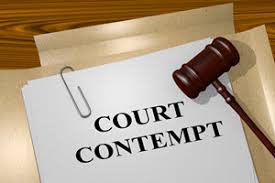Contempt of court in nigeria
In this article we shall be looking at contempt of court in nigeria and some countries across the globe.

Table of Contents
What is contempt of court
The Black’s Law Dictionary defines contempt as a “conduct that defies the authority or dignity of a court or legislation”. Contempt of court is a broad common law doctrine. The law of contempt is essentially concerned with interference with the administration of justice.
Contempt was plainly defined by Lord Diplock as: though criminal contempts of court may take a variety of forms, they all share a common characteristic: they involve an interference with the due administration of justice, either in a particular case or more generally as a continuing process. It is justice itself that is flouted by contempt of court, not the individual court or judge who is attempting to administer it.
Contempt of court in nigeria
In the case of FRANKLIN ATEKE V. ATTORNEY GENERAL OF THE FEDERATION & ANOR. Idigbe, JSC said in defining contempt of Court: “ It is indeed difficult to give exact definition of contempt of Court and this is so because it is so manifold in its aspects but generally it may be described as any conduct which tends to bring into disrespect , scorn , or disrepute to the law or which tends to interfere with and or prejudice litigants and or witnesses in the course of litigation. ”
FURTHERMORE, In A.G V MAGAZINE LTD contempt was also defined as; ‘’An Interference with the administration of Justice either in a particular case or more generally as a continuing process ’’
WHY SHOULD THE COURT PUNISH FOR
CONTEMPT?
Purpose of Contempt of court
1- To preserve the Honor of the court
2- To prevent undue interference with the
administration of justice So as not to disregard the power and dignity of the judge as an individual.
SEE PARASHURAM DETARAM SHAMDASANI V KING EMPEROR.
Types of contempt of court
The following are the types of contempt of court.
1- Criminal Contempt
2- Civil Contempt
CRIMINAL CONTEMPT
This consists of words or acts which obstruct or tend to obstruct or interfere with the administration of justice . For instance;
To call a judge a liar or
To allege that he is partial or
To say in the course of the judgment “ That is a most unjust remark ”
CIVIL CONTEMPT
This is contempt in procedure consisting of the disobedience to the Judge’ s orders and other processes of Court and may involve personal injury. For instance, Where a person is asked not to trespass on a property, if he does so, it is disobedience to the Court’s order and the injury is done to the Court’s integrity and private injury to the person concerned. See WOKOMA V WOKOMA
WHAT ARE THE ACTS THAT WOULD AMOUNT TO CONTEMPT?
Imagine while the case is on and Mr A2Z is
busy chewing gum in the court like the‘’ SISTERS OF THE NIGHT’’ or while Bro Dele and Bro Ade are busy discussing how Barcelona demolished Real Madrid and Suddenly Bro Ade shouted like the ‘’ BROTHERS OF THE CAR PARK’’ Will these acts amount to Contempt? Think about it ……
TAKE NOTE; It is not possible to particularize the act which can and cannot constitute contempt.
See AGBACHOM V . STATE (1970 ) 1 ALL NLR 69 AND it is not every act of discourtesy to the Court that amounts to contempt. See UZUORA V . R . 13 WACA 313.
TAKE NOTE: A breach by counsel of his duty to his client does not necessarily amount to contempt . For example, if he fails to appear in Court on a hearing day . SEE IZUORA V QUEEN.
EXAMPLES OF CRIMINAL CONTEMPT
The following are Example of criminal contempt of court.
1- Scandalizing The Court
2- Calling a Judge a Liar
3- Alleging that a Judge is partial
4- To say in the course of the judgment “ That is a most unjust remark ”
5- A letter accusing a Judge of Bias
6- Interrupting Court Proceeding by Words or Conduct
7- Whistling or Singing in the Court while the court is sitting
8- Talking Loudly in Court
9- Chewing gum loudly in court .
EXAMPLES OF CIVIL CONTEMPT
The following are Examples of civil contempt of court.
1-: Willful disobedience to Judgments or Court orders
2- Impeding Service of Court Process etc … . .
HOW CAN CONTEMPT BE COMMITTED?
The contempt of court can be committed in two ways:
1- In Facie Curiae (In the face of the Court)
1- Ex Facie Curiae ( Outside the court)
Procedures for contempt of court
In AWOBOKUN V . ADEYEMI; ‘’ the contemnor phoned the judge and the following morning, the judge asked her to show cause why she should not be committed for contempt. The Judge committed her for contempt and she appealed . She got away with the contempt. on appeal because the judge adopted a wrong procedure ’’
So the question what is the RIGHT PROCEDURE?
N. B: The Procedure will depend on how the Contempt was committed.
HOWEVER , the question is;
HOW DO YOU PROVE A CONTEMPT OF COURT?
STANDARD OF PROOF: Proof beyond Reasonable Doubt.
WHY: Contempt is Quashi – Criminal Offense.
It is an established principle that it does not matter whether contempt is Criminal or Civil the standard of Proof is beyond reasonable doubt . SEE AWOBOKUN V ADEYEMI AND AMERICAN INT SECURITY & TELECOMMUNICATIONS SYSTEMS ( NIG) LTD V ELUGENE PETERSON & ANOR.
THE PROCEDURE
Guiding Rule: No Person shall be punished for contempt of Court which is a criminal offence unless the specific offence charged against him is distinctly stated and an opportunity of answering it given to him . OBIEKWE ANIWETA V THE STATE
CRIMINAL CONTEMPT
IN FACIE CURIAE
The Court can deal summarily with cases of contempt in the face of the Court and by the very judicial officer in whose presence the offence was committed but in cases of contempt not committed in the face of the Court, the Court has two options:
Option One (SUMMARY TRAIL)
There may be cases where the offence could be dealt with summarily but it must be in accordance with the cardinal principles of fair hearing and the case must be one in which the facts surrounding the alleged contempt are so
notorious as to be virtually incontestable. The contemnor is given adequate opportunity to defend himself . If the Contempt is proved, the contemnor is convicted for contempt and sentenced.
Option Two (FULL PROSECUTION )
The proper procedure is the whole process of apprehension or arrest, charge, prosecution etc, in other words
The Contemnor is arrested by the Police, A charge will be drafted, the Contemnor is arraigned before another Judge not the Judge affected to take his plea.
He is prosecuted in full criminal trail.
Then , the Judge will give a Judgment
In BOYO V . ATTORNEY GENERAL OF MIDWESTERN STATE (1971 ) 1 ALL NLR 342, the Supreme Court advised that;
Judges must be very careful in handling contempt cases because of the peculiar nature of the offence. In a contempt case, the contemnor is usually reduced to such a state of humility in fear of more stern consequences that he is unable or willing to defend himself as he might otherwise have done. It is for this reason that the standard of proof required in contempt cases is ‘proof beyond reasonable doubt.
IN EX FACIE CURIAE
These are criminal contempt committed outside the face of the court which is intended or likely to interfere or obstruct the administration of Justice .
The case has to be referred to another judge and the normal criminal procedure has to be followed . See RE : DR . OLU ONAGORUWA
(UNREPORTED) FCA/E/ 11779 of 5 th February 1980.
Therefore, the option two stated above will also be followed .
CIVIL CONTEMPT
Generally, civil contempt are committed outside the face of the court. Contempt Ex Facie Curiae.
The Procedure
We have two options or ways available.
Option One.
The Party affected by the contempt would do any of the following;
File a Motion to the court to have the Contemnor committed for contempt
The motion is supported by Affidavit disclosing the grounds for the application
The Motion will be heard ; it is either granted or refused.
The party affected by the contempt may also do any of the following;
File and Serve on the Contemnor FORM 48 of the High Court (Civil Procedure ) Rules; Sheriff and Civil Process Act Attach the enrolled order of court to it.
If he fails to comply with the order , FORM 49 would be served on the Contemnor
The summon would be heard by the Court.
N. B : FORM 48 : Notice of Consequences of Disobedience of Court Order
FORM 49 : Summons to Show cause why
Contemnor should not be committed to prison for disobedience of court order
Option Two
The court can Suo Motu make an Order of
committal of a person for civil Contempt.
JURISDICTION OF COURT TO PUNISH FOR CONTEMPT
The High Court has inherent jurisdiction to
punish criminal contempt summarily but the power should be exercised with the greatest caution . AWOBOKUN V ADEYEMI
TAKE NOTE;
The inherent power to fine and imprison for contempt is not retained for the personal aggrandizement of a judge or whoever mans the Court. The powers are created, maintained, and retained for the purpose of preserving the dignity or honour of the Courts. See Section 133 of the Criminal Code. Section 133( 4 ) of the Criminal Code provides thus :
“Any person who while a judicial proceeding is pending makes use of any speech or writing misrepresenting such proceedings or capable of prejudicing any person in favour of or against any party to such proceedings or calculated to lower the authority of any person before whom such proceedings is being heard or taken. ”
FURTHERMORE ,
Section 6 of the Criminal Code and it provides:
“Nothing in this law or in the Code shall affect the authority of the Courts of record to punish a person summarily for the offence commonly known as contempt of Courts . ”
PUNISHMENT FOR CONTEMPT COURT
GUIDING RULE : A charge of Contempt is a very serious offence and in the spirit of protecting our Temple of Justice and not to bolster up the power and dignity of the judge as an individual . Any acts or conducts which tends to invade these concepts should be frown at and dealt with in a good time as well.
THE PUNISHMENT
The Courts will pardon a contemnor whose conduct is unintentional and who purges his contempt by a sincere apology and credible explanation . OR his act is from a mistaken belief or misconception of the laws thereby flouting a court’ s order. SEE THE STATE HON JUSTICE A.A.M EKUNDAYO & ANOR
Contempt committed in Under Section 133 of the Criminal Code carries a maximum sentence of three months. See OKOMA V. UDOH ( 2002) 1 NWLR (PT . 748 ) 438
For civil contempt, the punishment permissible by law is six months . See AFE BABALOLA V . FEDECO
The Court also has the power to order that a contemnor be kept in custody till he purges himself of the contempt. See ATEKE ’ s case.
Let us now examine the contempt laws in some countries:
In Canada, contempt of court is an exception to the general principle that all criminal offenses are set out in the federal Criminal Code.
The Canadian contempt of court offense include the following behaviors:
i. Failing to maintain a respectful attitude,
ii. Failing to remain silent or failing to refrain from showing approval or disapproval of the proceeding,
iii. Refusing or neglecting to obey a subpoena,
iv. Wilfully disobeying a process or order of the court and interfering with the orderly administration of justice or impairing the authority or dignity of the court.
Under the Canadian Federal Court Rules (Rules 466 and Rule 467), a person who is accused of contempt needs to be first served with a contempt order and then appear in court to answer the charges. Convictions can only be made when the requirement for proof beyond a reasonable doubt is achieved.
If it is a matter of urgency or the contempt was done in front of a judge, that person can be punished immediately by the judge. Punishment can range from the person being imprisoned for a period of less than five years or until the person complies with the order or fine.
Contempt of Court in England and Wales
English law on contempt (the Contempt of Court Act as1981), the maximum sentence for contempt is two years.
Contempt means Disorderly, contemptuous, or insolent behaviour toward the judge or magistrate while holding the court, tending to interrupt the due course of a trial or other judicial proceedings trial or other judicial proceeding, may be prosecuted as “direct” contempt. The term “direct” means that the court itself cites the person in contempt by describing the behaviour observed on the record.
Direct contempt is distinctly different from indirect contempt.
The latter requires another person to file papers alleging contempt against a person who has wilfully violated a lawful court order.
Criminal contempt of court in England
The British Crown Court has power to punish for contempt of its own motion when it notices disobedience of a court order or breaches of undertakings to the court. Where it is necessary to act quickly, the judge (even the trial judge) may act to sentence for contempt. Where it is not necessary to be so urgent, or where indirect contempt has taken place, the Attorney General can intervene and the Crown Prosecution Service will institute criminal proceedings on his behalf before a Divisional Court of the Queen’s Bench Division of the High Court of Justice of England and Wales.
The Magistrates’ Courts are not superior courts of record, but nonetheless wield contempt powers under the Contempt of Court Act 1981. Under the law, a Court may detain any person who insults the court or otherwise disrupts its proceedings until the end of the sitting. Upon the contempt being either admitted or proved, the judge may imprison the contemnor for a maximum of one month, fine the contemnor up to £2,500, or do both. It is contempt of court to bring an audio recording device or picture-taking device of any sort into an English court without the consent of the court.
It is not contempt of court (under section 10 of the Act) for a journalist in Britain to refuse to disclose his sources, unless the court has considered the evidence available and determined that the information is “necessary in the interests of justice or national security or for the prevention of disorder or crime.”
Strict liability contempt of court in England
Under the Contempt of Court Act 1981, it is criminal contempt of court to publish anything which creates a real risk that the course of justice in proceedings may be seriously impaired. It only applies where proceedings are active, and the Attorney General has issued guidance as to when he believes this to be the case, and there is also statutory guidance. This provision further prevents the print and electronic media from publishing material that is too extreme or sensationalist about a criminal case until the trial or linked trials are over and the juries have given their verdicts.
Civil contempt in England
In civil proceedings, there are two main ways in which contempt can be committed. Failure to attend at court despite issuance of summons requiring attendance or failure to comply with a court order. A copy of the order, with a “penal notice”—i.e., notice informing the recipient that if they do not comply, they are subject to imprisonment—is served on the person concerned. If, after the service of the notice, the contemnor still breaches the order, proceedings can be started and in theory the person involved can be imprisoned. In practice, however, this rarely happens as the cost on the claimant of bringing these proceedings is significant and in practice imprisonment is rarely ordered as an apology or fines are
usually considered appropriate.
Contempt of court in India
In India, contempt of court takes two forms:
i. They are civil contempt and criminal contempt.
Civil contempt: Under Section 2(b) of the Contempt of Courts Act of 1971, civil contempt has been defined as wilful disobedience to any judgment, decree, direction, order, writ or other process of a court or wilful breach of an undertaking given to a court.
Criminal contempt: Under Section 2(c) of the Contempt of Courts Act of 1971, criminal contempt has been defined as the publication (whether by words, spoken or written, or by signs, or by visible representation, or otherwise) of any matter or the doing of any other act whatsoever Scandalizes or tends to scandalize, or lowers or tends to lower the authority of, any court, or interferes or tends to interfere with the due course of any judicial proceeding, or interferes or tends to interfere with, or obstructs or tends to obstruct, the administration of justice in any other manner.
Defenses allowed in court contempt proceedings.
Clause (b) of Section 13 of Contempt of Court Act, 1971 that was introduced recently by 2006 amendment, allows the accused to raise the defense of justification by truth of such contempt, if the court is satisfied that it is in public interest and the request for invoking the said defense is bona fide. However, no court shall impose a sentence under this Act for a contempt of court unless it is satisfied that the contempt is of such a nature that it substantially interferes, or tends substantially to interfere with the due course of justice.
CONTEMPT OF COURT IN GHANA
In the Supreme Court case of Republic v Nkansah (unreported, November 1995), Hayfron-Benjamin JSC (as he then was) defined contempt of court as “Conduct that tends to bring the authority and administration of the court into disrespect or disregard, and or to interfere with or prejudice parties, litigants, or their witnesses is a contempt.”
The concept of Contempt of court can also be defined as the “deliberate disobeying of a court order. The conduct can occur in or out of court.
In court, the conduct may also be a significant disruption of or disregard for the court. Typical examples include refusal to obey a judge or magistrate command (such as to quiet down), to refuse to answer proper questions, refusal to follow local rules, etc.”
Contempt has also been defined by the Court in the case of Republic v High Court, Accra; Ex-Parte Laryea Mensah as follows:
“By definition, a person commits contempt and may be committed to prison for wilfully disobeying an order of the court requiring him to do any act other than the payment of money or abstain from doing some act; and the order sought to be enforced should be unambiguous and must be clearly understood by the parties concerned.”
It is trite fact that, the Superior Courts have the absolute power to commit anyone who reduces the integrity of the Judiciary to the lowest substratum for contempt. Kulendi, JSC emphatically stated:
“… the powers of the Superior Courts to commit anyone for contempt have always been inherently recognized by the Courts at Common Law. In the Ghanaian legal jurisprudence, this critical power of the courts to commit for contempt has received statutory emboldenment and constitutional crystallisation. The 1992 Constitution which is the supreme law of the land and which embodies the hopes and aspirations of Ghanaian people has conferred on all Superior Courts, the power to commit for contempt to themselves.”
Reference:
CONCEPT OF CONTEMPT OF COURT IN GHANAIAN LEGAL JURISPRUDENCE By: Anthony Goodnuff Appiah Larb: (Contempt of court in Ghana, Canada, England and India).
COURT PLACEMENT 2017: lCONTEMPT OF
COURT AND FILLING OF LOGBOOK By: group4hub.blogspot.com/2017/04/court-placement-2017-contempt-of-court.html









